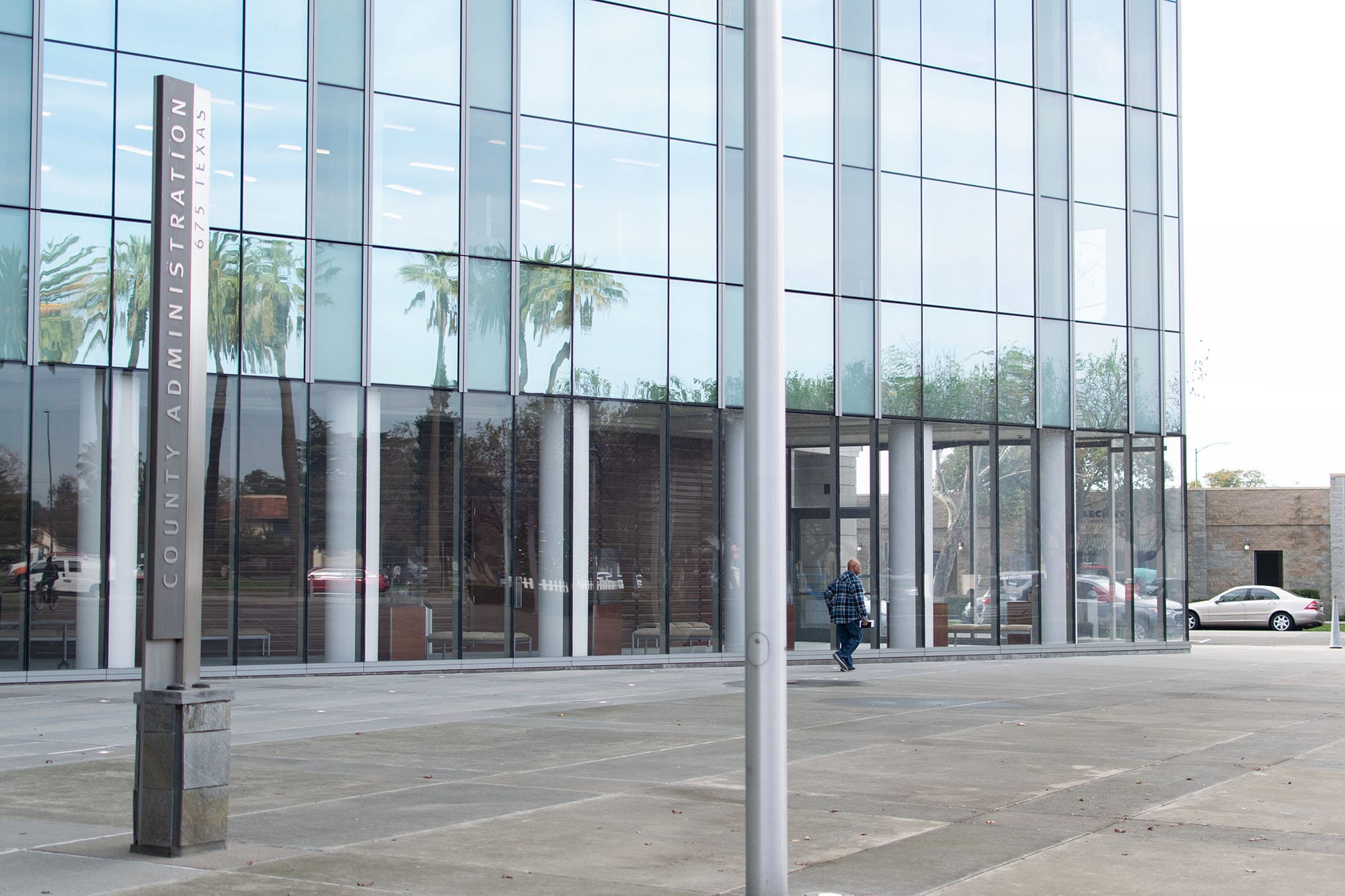VALLEJO – Willie McCoy’s family can’t wait for the full story to come out.
At the fourth annual vigil at the drive-thru where McCoy was killed in 2019, his family continued to chip away at the Vallejo police narrative that McCoy reached for a gun in his lap when he awoke to six Vallejo police officers yelling at him and shining their flashlights in his face.
Seconds later, they fired 55 times into his silver Mercedes. An attorney representing his family said Thursday that a medical examiner had never seen more bullets in a human body before: 38.
McCoy, a 20-year-old community college student who rapped under the name Willie Bo, was the 18th person killed by Vallejo police since 2010. There’s only been one other since then.
McCoy’s brother Kori McCoy said Thursday evening that the city has failed to produce evidence to support the police narrative that Willie reached for a gun.
“None of that shit is true,” Kori McCoy said. “And we have the evidence to prove it. And we're gonna show it to the world.”
Part of that evidence, his family said, includes depositions from the officers involved in that particular so-called officer-involved shooting.
Vallejo police have said that McCoy had a gun on his lap and reached for it while ignoring their commands. Body camera video showed that the officers did not attempt to distance themselves from McCoy, but rather crowded around the car with their guns drawn. The firepower the officers used left fist-sized holes in the windshield and passenger window, reducing the automotive glass to thin, flexible ribbons that fluttered in the winter wind.
McCoy’s family is four years into a federal civil rights lawsuit that alleges a gang culture among Vallejo police and calls for a federal monitor like one that has been in place for the Oakland Police Department for decades. In depositions for that lawsuit, none of the officers who shot McCoy would testify under oath that they had seen a gun in McCoy’s lap, McCoy’s family said.
“Now they're facing the penalty of perjury,” Kori McCoy said, “so we're looking forward to when we can share all this testimony because this isn't a conspiracy theory. This has been an ongoing criminal conspiracy in this city.”
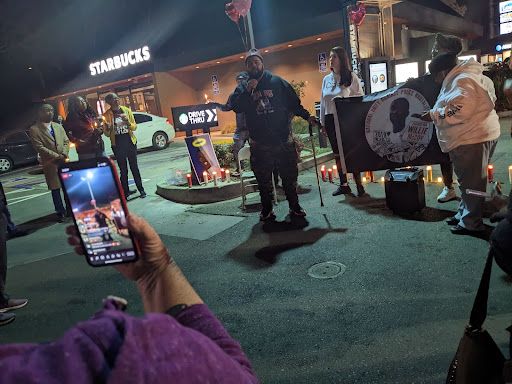
The Vallejo police killing of Willie McCoy, four years later
On yet another cold Feb. 9 night in Vallejo, Melissa Nold, the attorney representing the McCoy family in their federal lawsuit against the city and its police department, invited people impacted by police violence to speak along with others who share the trauma of being impacted by police violence.
“This is the family that no one wants to be a part of,” Nold said.
That included the families of Ronell Foster, Angel Ramos, Jared Huey, and others killed by Vallejo police as well as the families of people killed by police elsewhere: Steven Taylor in San Leandro and Stephon Clark in Sacramento.
The drive-thru at 976 Admiral Callaghan Way where McCoy was killed — now a Starbucks — is in the parking lot of a mini-mall just off I-80 in North Vallejo. Family members lit rows of candles at the entrance to the drive-thru where Vallejo police were called on Feb. 9, 2019, for a welfare check for an unresponsive driver.
Six officers responded: Anthony Cano, Jordon Patzer, Colin Eaton, Bryan Glick, Mark Thompson and Ryan McMahon.
Cano and Patzer were the first to respond.
“Gun. Gun,” Cano told Patzer. “Call it out.”
“What?” Patzer replied.
“There’s a gun in his lap,” Cano said. “I’m going to bust that fucking window. See it? Door looks open. I’m going to pull him out and snatch his ass.”
While it hadn’t been made public by then, several higher ups in the department were aware of a tradition that officers bent the tips of their star-shaped badges to mark on-duty shootings. If officers believed a suspect had a weapon at the time of the shooting, it would all but guarantee the shooting would be ruled justified by department heads and the district attorney.
“If he reaches for it,” Thompson said to Cano, referencing the gun allegedly in McCoy’s lap, “you know what to do.”
“Yup,” Cano replied.
Questioned hours later after the shooting by fellow officers with an attorney provided by their police union present, the officers said they had no other option but to shoot because all of McCoy’s doors were locked and windows were up, so they couldn’t grab the gun or restrain McCoy. But investigators didn’t question any of the officers regarding the plastic sheet covering the passenger window, which had no glass.
Instead, officers opened fire. It wasn’t until June 2019 that Vallejo disclosed the number of bullets discharged. As internal affairs interview recordings released years later revealed, most officers thought they fired half as many times as they actually did. Eaton fired the most: 14 rounds.
All of the officers involved would be cleared in the shooting except for Ryan McMahon. McCoy was the second person McMahon killed in a year.
On Feb. 13, 2018, McMahon attempted to stop Ronell Foster while he was riding his bike at night without a light, later telling his superior officers he wanted to educate him about bicycle safety. McMahon beat him with a flashlight, Tased him, and shot him in the back and the back of the head.
The following year, McMahon arrived at the Taco Bell just as the officers opened fire at McCoy. He fired one round. Vallejo police became aware that McMahon had added a plate to his gun with the words “Veritas” and “Aequitas," meaning “truth” and “justice,” which was popularized by the 1999 film Boondock Saints where two Catholic brothers gunned downed men they believed to be breaking God’s laws.
The department launched an investigation and department superiors noticed the two bends in his badge, which McMahon said were for the two men he’d killed on duty, Whitney later said in a lawsuit. Whitney was later fired, disclosed the department’s badge-bending tradition, and filed a wrongful termination suit in 2020.
In March 2022, current and former Vallejo police officers were compelled to testify about the genesis and scope of officers bending each other's badges. Solano County Superior Court Judge Daniel J. Healy said McMahon “enthusiastically” participated in the department’s badge-bending culture and had “gone off the rails.”
The city of Vallejo settled a federal civil rights lawsuit with Foster’s family in 2018 for $5.7 million, the largest sum it’s paid to date to victims of its police department’s violence.
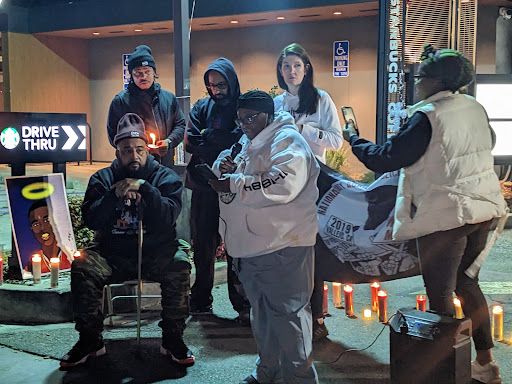
A yearly vigil
The day after Vallejo police killed McCoy, his cousin, David Harrison, called what happened to Willie “an initiation” and “a blood oath ritual.” Kori McCoy, Willie’s brother, recalled people asking him to reel David in. They did the opposite.
“We took our common sense, and we became students of the history of policing in Vallejo, California,” McCoy said.
On the second anniversary of McCoy’s killing, his family and others of those impacted by police violence in Vallejo and beyond gathered on the front steps of California’s Capitol, where lawmakers have passed legislation shedding sunlight on police officers who hurt people or lie. Or both.
On the most recent Feb. 9, as the sun was setting and temperatures were falling in Vallejo, Nold, the family’s attorney, broke down what has become public knowledge in the four years since Vallejo police killed Willie McCoy, from inappropriate records destruction to the badge-bending that’s become synonymous with one of the most deadly police departments in California.
“The family still has just as much motivation to get justice for Willie as they did when this first happened because, at the end of the day, we have had no justice,” Nold said. “There has been no arrest. There's been no prosecution. There's been no discipline.”
Nold said these revelations about the department’s conduct and culture — including terminating the captain who tried to do something about it — have vindicated members of the McCoy family, who were first labeled as “nuts” about McCoy’s killing being part of an initiation ceremony.
“Now we’re starting to see what was really happening. All the things that we were saying are happening have been proven,” Nold said. “All of the badge-bending, the things that years ago, people thought that the McCoy family was nuts when they were talking about murder rituals and blood rituals. Now, we find out it happened. It happened. And not only did it happen, people have testified under oath about it in court. There are receipts there.”
A judge recently ruled that the McCoy’s family lawsuit’s claim that McCoy was killed as part of a conspiracy can proceed, based on the revelations since his death about the department’s nearly two-decade tradition of marking the very symbol of their authority when they injure or kill someone.
McCoy’s family also pointed to evidence that Vallejo police didn’t explore any other options when responding to a call about someone who may need help.
“My baby brother's window was already shattered. It was gone. It was a piece of plastic on there,” Sharmell Mitchell, McCoy’s oldest sister, said Thursday night. “So they could have just took the plastic off of it and opened the door. They could have just walked him out.”
Barbara Dorsey, Willie’s older sister, said Vallejo police took away a person known for his laugh and his silliness, whether that be as a son, brother or uncle.
“Every day that he's not here, it's hard. It hurts,” Dorsey said. “They don't understand what they do when they take people's loved ones from them. And how traumatizing it is for the whole family.“
“They take innocent people and just do what they do to them,” Dorsey said. “It's wrong. They leave behind damaged families. It's just hard. It is traumatizing. Very traumatizing.”
Faced with the continuing public relations crisis, the city and its police department still attempts to reach the public through events they host like Coffee with the Cops.
“None of that is more important than police officers murdering people in the city and the city government covering it up,” Kori McCoy said, “and you guys want to have lunch and kumbaya with the same people that looked the other way and acted like they didn't know what was going on?”
“They knew, and you all are gonna find out when the testimony is released,” Kori McCoy said. “They all knew, and they're all complicit.”
Not long after Vallejo’s tradition of officers bending each other badges after a shooting was revealed, subpoenaed records corroborated the practice. The city is expected to pay millions of dollars in police civil rights lawsuits, but one of the people working on those lawsuits says it’s about creating change more than anything else.
“The money means nothing,” Nold said. “It means you get to grieve on a nicer couch.”
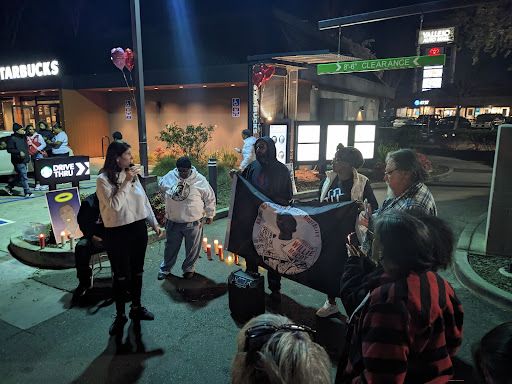
Editor's note: This story has been updated to clarify that McMahon did not tell Whitney directly why his badge was bent.
Before you go...
It’s expensive to produce the kind of high-quality journalism we do at the Vallejo Sun. And we rely on reader support so we can keep publishing.
If you enjoy our regular beat reporting, in-depth investigations, and deep-dive podcast episodes, chip in so we can keep doing this work and bringing you the journalism you rely on.
Click here to become a sustaining member of our newsroom.
THE VALLEJO SUN NEWSLETTER
Investigative reporting, regular updates, events and more
- policing
- Willie McCoy
- Melissa Nold
- Kori McCoy
- Vallejo Police Department
- Ronell Foster
- Angel Ramos
- Jared Huey
- Steven Taylor
- Stephon Clark
- Anthony Cano
- Jordon Patzer
- Colin Eaton
- Bryan Glick
- Mark Thompson
- Ryan McMahon
- Badge bending
- John Whitney
- Daniel Healy
- Sharmell Mitchell
- Barbara Dorsey
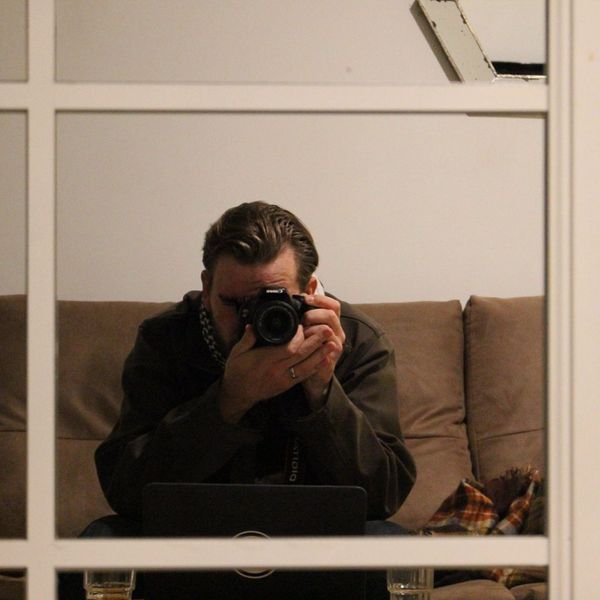
Brian Krans
Brian Krans is a reporter in the East Bay who covers public health, from cops to COVID. He has written for the Oaklandside, Healthline, California Healthline and the Appeal.
follow me :




